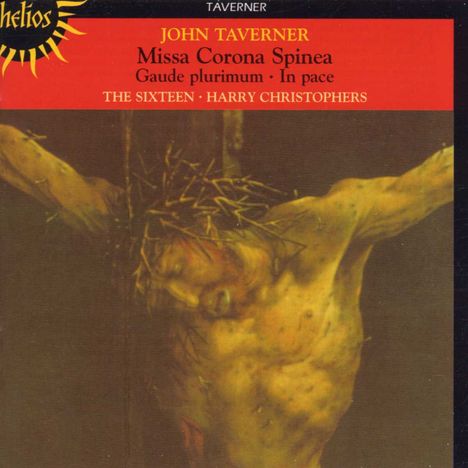John Taverner: Missa Corona Spinea on CD
Missa Corona Spinea
Conventional CD, playable with all CD players and computer drives, but also with most SACD or multiplayers.
+Gaude plurimum; In pace
John Taverner wurde in Lincolnshire geboren, wahrscheinlich in der Nähe von Tattershall, wo er 1525 als Schreiber der Stiftskirche geführt wird. Man nimmt an, dass er ausserdem einen Teil seines frühen beruflichen Werdegangs in London absolvierte; jedenfalls hatte er sich soweit einen Namen gemacht, dass er im November 1526 zum Informator Choristarum des von Wolsey neu gegründeten Cardinal College in Oxford ernannt wurde. Ein Jahr später liess sich Taverner vorübergehend mit einer Gruppe von Männern an der Universität ein, die mit lutheranischem Gedankengut sympathisierten, und entging nur knapp einer Freiheitsstrafe. Nach Wolseys Absetzung im Jahre 1529 war das Schicksal des Cardinal College vorübergehend ungewiss (es wurde schliesslich 1532 von Heinrich VIII. neu gegründet und Taverner nahm im April 1530 seinen Abschied. Sein Verbleib bis 1537 ist unbekannt, doch die restlichen acht Jahre seines Lebens sind relativ gut dokumentiert. Nachdem er sich in der Stadt Boston in Lincolnshire niedergelassen hatte, wurde Taverner als Bevollmächtigter für Thomas Cromwell angestellt, der vom König beauftragt war, im Vorlauf zu deren Auflösung eine Begutachtung und Schätzung der kleineren Klöster und Stifte vorzunehmen. Im Gegensatz zu der oft geäusserten Behauptung, er habe sich als fanatischer Verfolger erwiesen, liegen konkrete Beweise vor, dass Taverner seine Arbeit mit Fürsorge und Einfühlungsvermögen verrichtete.
Er starb am 18. Oktober 1545 in Boston und wurde unter dem berühmten Turm der dortigen Gemeindekirche begraben.
Product-Information:
Not a great deal is known about the life of John Taverner. He is thought to have been born around 1490 in Lincolnshire, and is first documented in 1525 as a lay clerk at the collegiate church of Tattershall, a musical establishment of some importance. Later that year he was recommended by Bishop Longland of Lincoln for the new post of Informator (choirmaster) at Cardinal College (now Christ Church), Oxford, founded by Cardinal Wolsey and lavishly endowed with a choir of sixteen choristers and twelve ‘clerkes skilled in polyphony’. After overcoming an initial reluctance to leave the security of Tattershall, he accepted this prestigious invitation in time for the formal opening of the College in October 1526. Its glory proved to be short-lived, however, and after Wolsey’s fall from power in 1529 its fortunes and finances soon began to decline. Taverner resigned the post in 1530. For the next seven years his whereabouts are unknown. Possibly he worked as a freelance musician in London, or perhaps he returned directly to Lincolnshire. From 1537 Taverner was in Boston, maybe employed as an agent for Thomas Cromwell, who had been commissioned by Henry VIII to carry out a survey and valuation of the lesser monasteries and friaries prior to their dissolution. There is no truth in the persistent claim that Taverner was a fanatical persecutor in carrying out these duties. The significance of the often-quoted note in the 1583 edition of Foxe’s Acts and Monuments that Taverner came ‘to repent him very much that he had made songs to popish ditties in the time of his blindness’ may well have been exaggerated; Foxe, an ardent Protestant, was writing some forty years after the composer’s death, and the term ‘popish ditties’ remains open to interpretation. On the contrary, there is documentary evidence that Taverner had genuine concern for the welfare of the monks and friars. The assumption that he ceased to compose after leaving Oxford is based on speculation, since a proportion of his output has probably been lost and what has survived is not always easy to date.
Taverner died in 1545 and was buried beneath the famous ‘stump’ of Boston church.
Rezensionen
'A superb disc and an astonishing bargain' (Penguin Guide to Compact Discs)
'I found this recording a pure delight' (Gramophone)
'Superb' (Organists' Review)
Disk 1 von 1 (CD)
-
1 Gaude plurimum (Marianisches Antiphon)
Missa Corona Spinea (Messe)
-
2 Gloria
-
3 Credo
-
4 Sanctus
-
5 Agnus Dei 1
-
6 Agnus Dei 2
-
7 In pace
More from John Taverner



